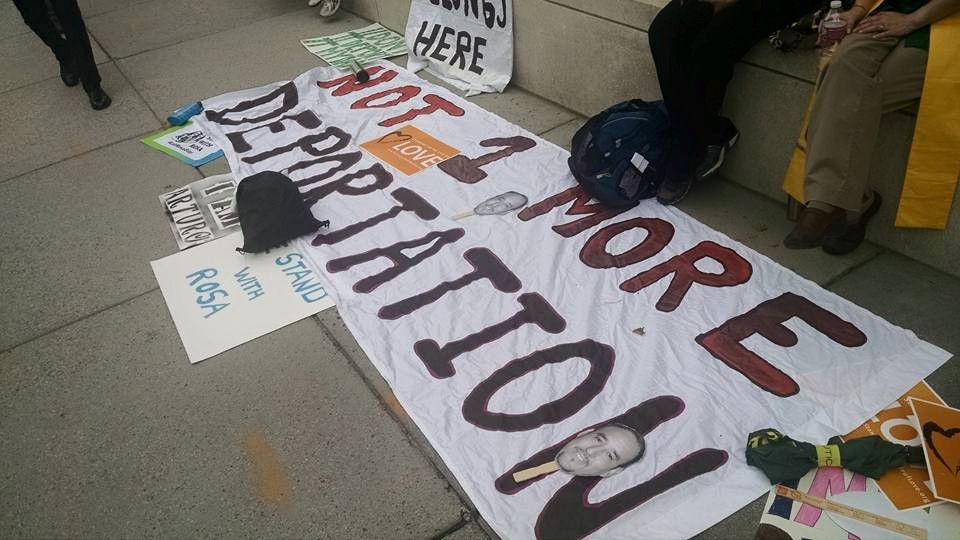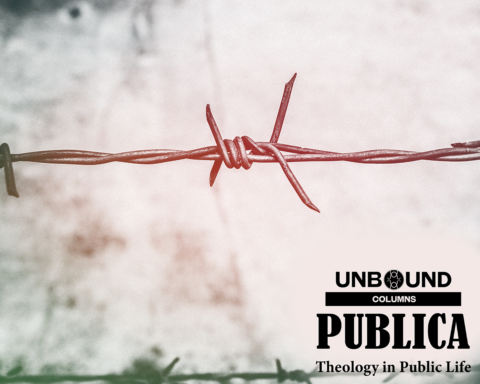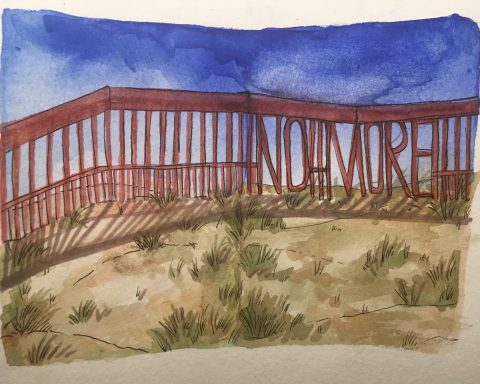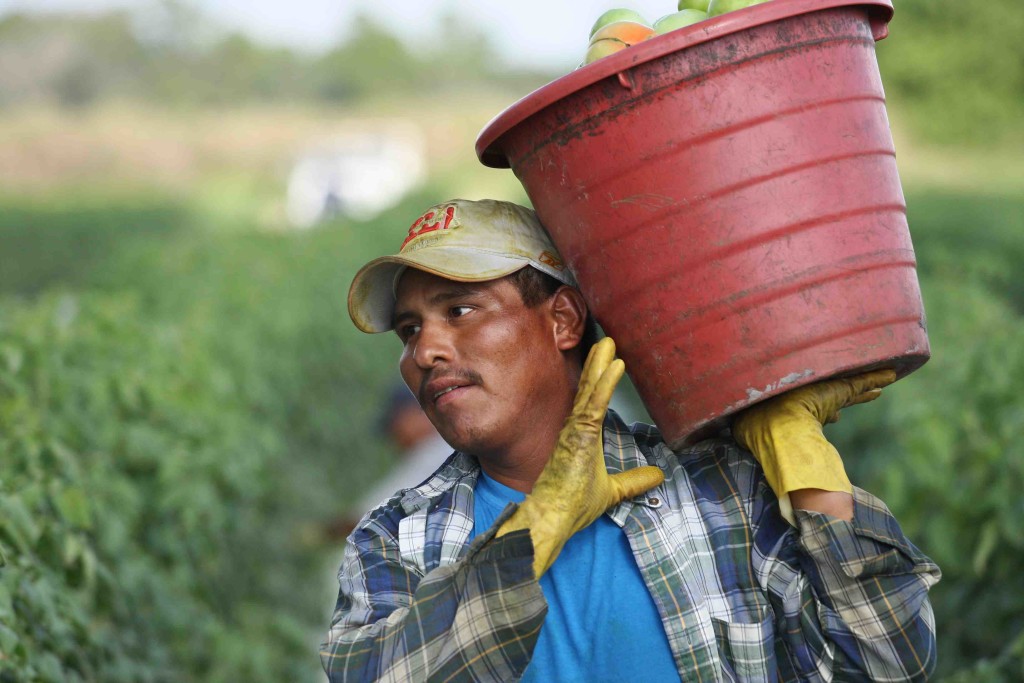Being the Church of Matthew 25

One year ago, I took in my first shocking breath of the Arizona heat.
Punctuated by saguaro cacti and surrounded by foreboding mountains, the Sonoran Desert represents one of the most treacherous climates for human survival. Despite rhetoric of dryness alleviating the burden of 120-degree weather, the scorching sun was just as oppressive as I had imagined. That valley of death has taken the lives of thousands of migrants who have taken the risk to cross it. An 18-foot-tall border wall separating border cities forces migrants to walk up to ten days in perilous conditions. Risking death by heatstroke, dehydration, arrest by Immigration Customs Enforcement (ICE), and abandonment by their coyotes, the desert is only the first barrier that migrants and refugees face upon their entrance to the United States. The border functions as a war zone, where migrants are targets of vigilantes, cartel members, and U.S. officials.
On the other side of the border wall, migrants face insurmountable challenges to “make it” in the Empire. Targeted by a fear-based dogmatic of racism, lack of political will to reform immigration, and heightened vulnerability to crime, migrants and refugees in our age lack basic protections that most citizens take for granted. While too many who take the journey do not make it to the other side of the border wall, those who do manage to cross then face countless invisible borders to overcome daily.
___________________________________________
As a Presbyterian, I believe that our faith is only truly alive when we are willing to risk our status and privilege to stand with the marginalized.
___________________________________________
Contemporary America is not unique in its struggle to recognize the humanity of its immigrant community. The authors of Zechariah name foreigners as part of the “quartet of the vulnerable” along with orphans, widows, and the poor. In the Book of Exodus, God liberates the Israelites from slavery in the land of Egypt and thereby commands them: “Do not oppress a foreigner; you yourselves were aliens in the land of Egypt” (Ex 22:21). The Book of Leviticus extends the call to “love the stranger as yourself, for you were strangers in the land of Egypt; I am the Lord your God” (19:34). The people who know YHWH as God are called to care for the vulnerable. This God who liberates the Israelites cares for the oppressed in their midst, for the covenant of peace is fulfilled when kindred live in harmony (Psalm 133).

Only sixty miles from the border wall, a small, adobe church in South Tucson has responded to the call to open its doors to the strangers in its midst. As the birthplace of the Sanctuary movement of the 1980s, Southside Presbyterian Church now organizes humanitarian aid in the desert and political campaigns to keep families united in the community. In 2014, Southside re-emerged as part of the New Sanctuary Movement, offering protection to individuals who risk being torn from their families by inhumane deportation policies.
The journey has not been an easy one, nor has it led to quick results. Southside’s most recent Sanctuary case endured for 461 days. This work of peacemaking demanded patience, persistence, and redefined visions of success. In the words of Rev. Alison Harrington, “We realized that we don’t find true solidarity in the moments when the work is easy, but rather in the moments when we don’t know if we have any hope left.” [1] Through those more than 14 months, Rosa Robles Loreto expressed her faith in God and in the community to carry her through. She also knows this work is far from complete: “I have faith in God that we will succeed, and that each of us will continue to cry out for justice for the many other mothers who risk be separated from their children,” she writes [2].
___________________________________________
Even as you are reading this, mothers are scrubbing floors for less than minimum wage, fathers are sweating under the scorching heat to tend fields, and Central American children are walking the length of Mexico to be reunited with their families.
___________________________________________
During my time as a ministry intern at Southside, I learned that Jesus calls us to love in radical ways, and this love comes with a cost. In Matthew 25, Jesus distinguishes between the sheep and the goats on the basis that: “I was hungry and you gave me something to eat, I was thirsty and you gave me something to drink, I was a stranger and you took me in…” (Matt 25:35). Identifying himself in the face of “the least of these,” Jesus calls his disciples to witness to their faith by being in relationship with these “least,” these strangers whom the Empire has shunned and excluded.

Now, particularly in light of a global refugee crisis, the call for the church to love our non-citizen neighbors as ourselves takes an urgent tone. Despite the insidious myth of the American dream, we know the tragic stories of immigrants’ daily plight. Perhaps we’ve become desensitized to the struggle of the non-citizens in our midst; nevertheless, the struggle continues. Even as you are reading this, mothers are scrubbing floors for less than minimum wage, fathers are sweating under the scorching heat to tend fields, and Central American children are walking the length of Mexico to be reunited with their families. As a church, we live in a society that discards migrants and refugees as pawns of the insatiable economy.
We also live in a world that is globalized and interdependent. The current “immigration crisis” is a visible manifestation of the stark inequalities that divide developed and developing nations, forcing people to uproot as quickly as the market and political mood shift. Driven by economic interest, the United States’ military presence in Latin America and East Asia has had devastating consequences on national sovereignty and political stability. Juan Carlos Ruiz, co-founder of the New Sanctuary Movement in New York who lived for eight years as an undocumented priest, reminds us that immigration is a product largely of American making: “As long as the flow of military and economic aid keeps flooding the global south, there always will be displaced people bubbling up. Forgive the cliché, but: we are here because you are there.”
___________________________________________
In the words of Rev. Alison Harrington, “We realized that we don’t find true solidarity in the moments when the work is easy, but rather in the moments when we don’t know if we have any hope left.”
___________________________________________
While root causes take hold of the global south, American citizens benefit each day from the exploitation of our neighbors who fill (and create) the most unwanted jobs of our economy, pay more than their fair share of taxes, and suffer from lack of access to dignified labor, higher education, and healthcare, among countless other benefits of citizenship. As Pulitzer Prize winning journalist and undocumented American Jose Antonio Vargas has often to pointed out, the border wall should contain two signs: “Keep Out” and “Help Wanted.” The messages our government and economy sends are conflicting, but both are ‘true’.

As a student at Davidson College this Spring I had the opportunity to hear Vargas address the campus community. He challenged us, “What are you doing to risk your privilege?” He cited examples of allies attending rallies, speaking out in the workplace for fair treatment of immigrants, and supporting scholarships for undocumented students. I have been continually inspired by those willing to put their bodies and lives behind solidarity: the teachers who put their career on the line to protest their students being stalked by ICE at bus stops, South Asian asylum seekers who denounce being placed in body bags by DHS, undocumented Black college graduates who challenge the stereotype that immigration only affects Latinos. The mobilization of thousands of undocumented activists and allies in the streets has taught me that the will to keep our communities and families together is stronger than any threat of division.
As a Presbyterian, I believe that our faith is only truly alive when we are willing to risk our status and privilege to stand with the marginalized. To do this, we first have to acknowledge the intersections of race, ethnicity, and gender identities with our advocacy efforts. Immigrant rights cannot simply be understood as a matter of getting the right papers. As a Chicano activist has stated, “Citizenship is not the goal — liberation is.”
If we look deeply at the fabric of undocumented communities, we recognize that not all immigrants are treated equally: Black immigrants are being detained and deported at 5 times the rate of others, LGBTQ detainees are 15 times more likely to be abused in detention centers, and the most recent round of raids targeted 121 Central American refugees, most of whom were women and children (and the next round of raids is scheduled for this month). The call to love our neighbors asks us to name the many walls that keep immigrants out, and to confront the lies of superiority that appear as often in our newspaper headlines as in our Bible study conversations.
___________________________________________
If we look deeply at the fabric of undocumented communities, we recognize that not all immigrants are treated equally: Black immigrants are being detained and deported at 5 times the rate of others, and LGBTQ detainees are 15 times more likely to be abused in detention centers.
___________________________________________
As a denomination, it is our choice as to how we use the power and status we have acquired as a body. The Presbyterian Church (U.S.A.) has been a leader for peacemaking and social justice; our constitution upholds our responsibility to join in God’s work in the world for “peace, justice, and human fulfillment.” Today we have the opportunity to continue this legacy, to take risks with and for the poor. This year at General Assembly, the overture titled “On Choosing to Be a Church Committed to the Gospel of Matthew 25” calls us to this very task: to realize true solidarity when the call of faith and the age of injustice demands us to take bold, prophetic action.

In my favorite translation of Matthew 5:48, Jesus calls us to, “Put no borders on your love, as your Heavenly Father places no borders on Divine love.” This borderless love of Christ transforms us, asks us to choose obedience over fear. Which we choose reveals the essence of our faith. Not only as individuals, but also as churches and corporate bodies, we have the opportunity to stand against the Empire’s logic of domination and instead choose the path of peaceful resistance. This path requires a heart for prayer and the faith to see God’s Spirit at work in the midst of destruction and to harness the power of confession for the ways we need to be changed.
The choice to be a church committed to the gospel of Matthew 25 embodies a profound act of healing and courage in a broken world. In the words of Rev. Alison Harrington, “At Southside, we believe that we are called to be a people of faith who proclaim the radical love of Jesus Christ within this empire of fear and anxiety. We believe that within a context of increasing acts of violence and a narrative of fear of the other, whether it be workers from Mexico or refugees from Syria, the only antidote to fear is not more walls, not more security, but more love, for the only real secure community is the beloved community. In the midst of these anxious, contentious and fearful times, for better or worse, we chose love.” [1]
___________________________________________
In my favorite translation of Matthew 5:48, Jesus calls us to, “Put no borders on your love, as your Heavenly Father places no borders on Divine love.”
___________________________________________
So long as we seek to be a church of Jesus Christ, we must choose love. This choice is both timely and costly: timely because our church is seeking to claim its identity as a peacemaking body at a time of increasing militarization and fear in our nation, and costly because it requires us to occupy lowly and estranged places. In the words of the late Rev. Kelly Allen, we are called “to build community among strangers” as God might have us do.

As we gather each day at the 222nd General Assembly, we can trust the temperatures of the Sonoran desert will climb as they do each summer, placing thousands of Central American children’s lives at risk. We know that political debates, too, will remain heated, threatening the vitality of American democracy. Yet while the powers of the world threaten to scorch and destroy, the love of Christ Jesus calls us to kindle the long-burning fire for justice and peace. This call to chose love is one we cannot ignore.
Let us commit this General Assembly to renew our love of God and neighbor in word and in deed. So long as we claim to live as the Body of Christ, may we witness to the radical and risky love to which our faith calls us. To stand in the heat of racism, to walk beside strangers through the valley of death and deportation, requires faith that we will recognize our shepherd as Christ walks with us. In the words of the overture, “Let us be counted among the sheep that met their King as a stranger,” willing to follow Him whose love knows no borders. [3] The road to peacemaking is long and arduous, and it is ours by the way of the cross to choose.
________________________________________________
[1] Alison Harrington, Faithful Resistance: Gospel Visions for the Church in a Time of Empire ed. Rick Ufford-Chase, ch. 1: “Confronting Empire at the Border.”
[2] Rosa Robles Loreto, “A Letter from Sanctuary,” http://forms.nomoredeaths.org/a-letter-from-sanctuary-rosa-robles-loreto/.
[3] Presbyterian Peace Fellowship, “On Choosing to Be a Church Committed to the Gospel of Matthew 25.” http://presbypeacefellowship.org/sites/default/files/Matthew25Overture2.pdf
*****
AUTHOR BIO: Elizabeth Welliver is a recent graduate of Davidson College, where she found her connection to the PC(USA) and majored in Religion. Last summer, she interned at Southside Presbyterian Church in Tucson, Arizona, and soon she will be joining the Davidson College Chaplaincy staff as a Fellow for interfaith engagement.
Read Overture 11-03: “On Choosing to be a Church Committed to the Gospel of Matthew 25.”
Read 12-11: Commissioner’s Resolution: “On Reaffirming the Ministry of Sanctuary by Congregations.”






Unbound Social